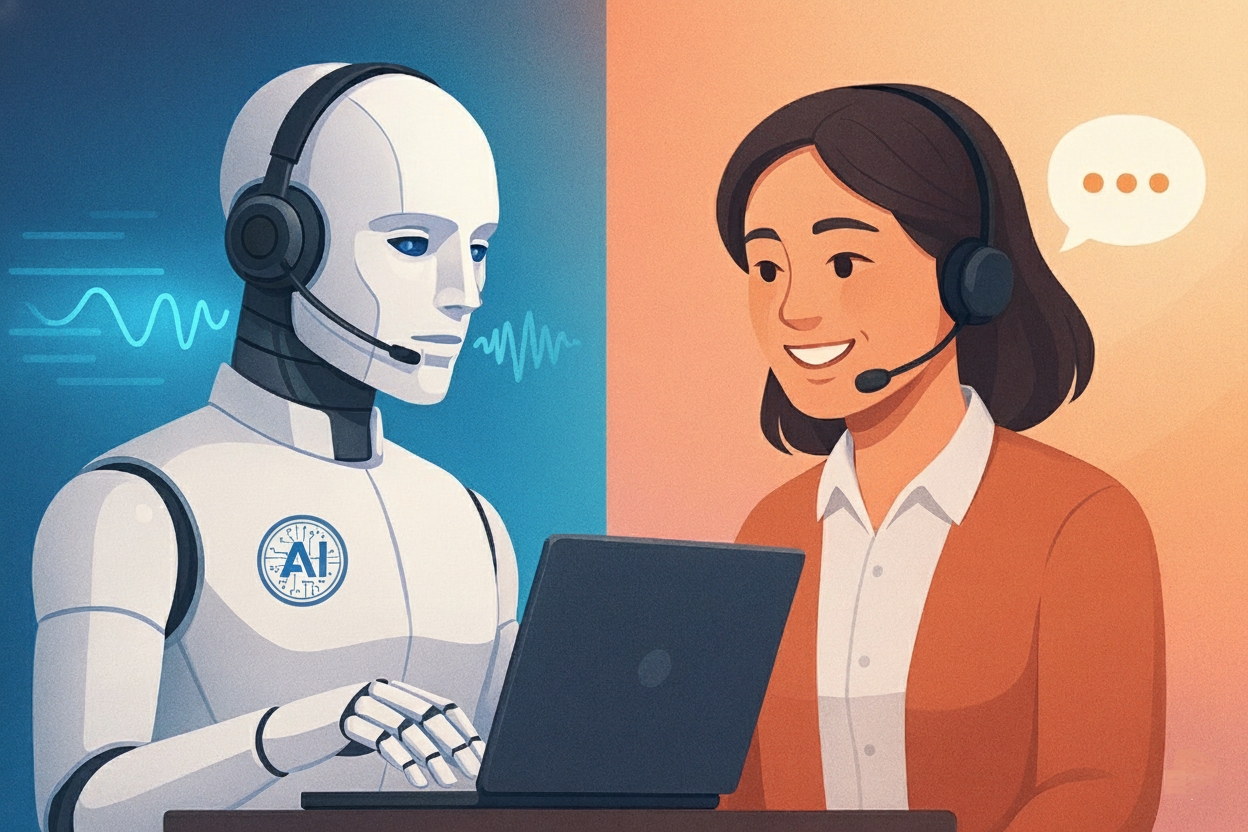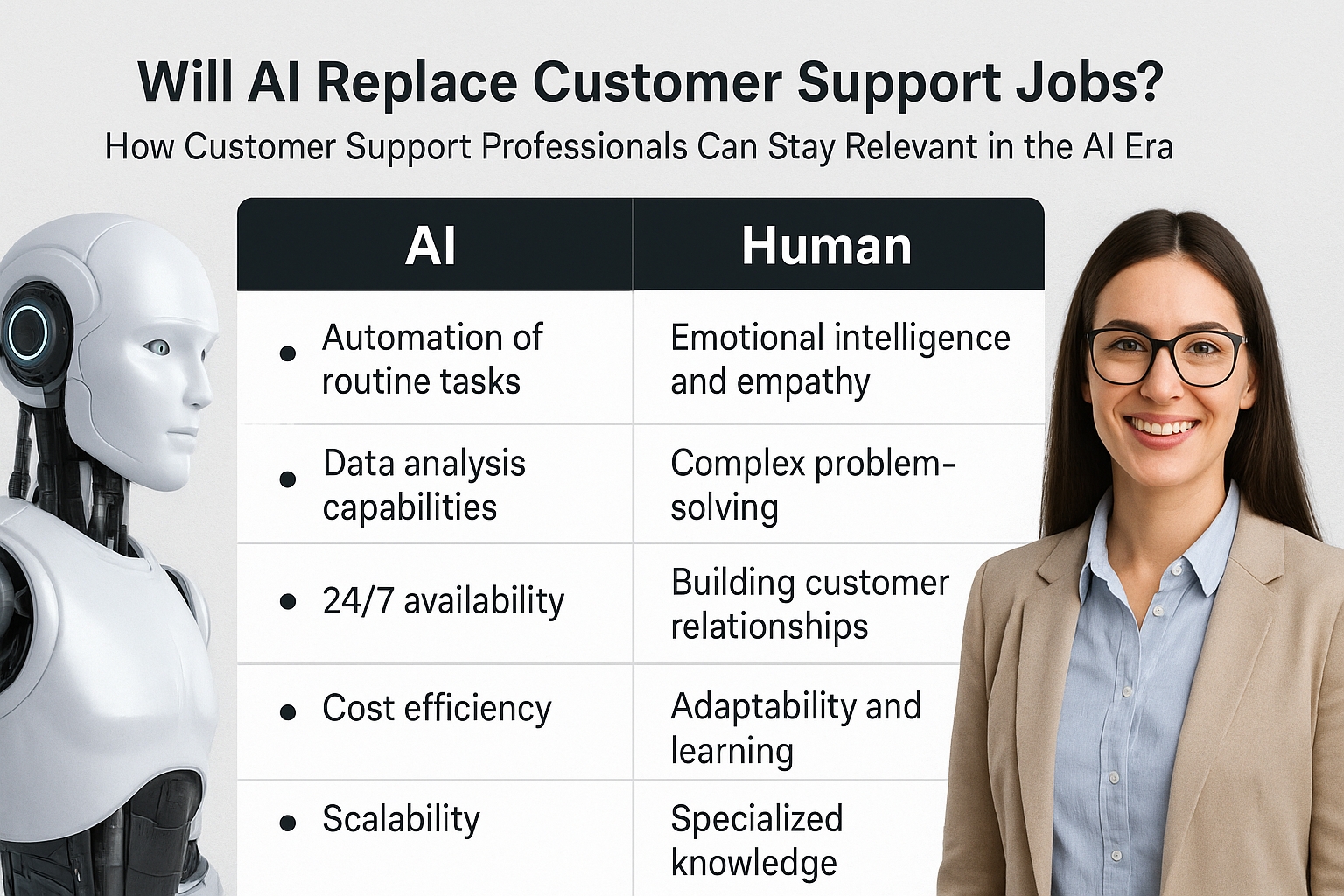AI is changing customer support faster than most people expected. Tasks that used to need human agents are now handled by chatbots and virtual assistants that work around the clock. This big shift has led many to wonder if AI replace customer support jobs completely in the near future.

The truth is, not everything can be automated. AI can handle simple, repetitive questions, but it still struggles to understand emotions, empathy, and the human touch that builds real trust. That’s where people make the difference.
As we move into 2026, the future of customer support looks more like teamwork between humans and AI. Those who learn how to use AI as a partner, not a competitor, will stay relevant and thrive in this new world of work.
(You can also try our AI Job Risk Calculator to see how your job compares.)
Will AI Replace Customer Support Jobs by 2035?
The short answer is not completely. While automation and AI tools will continue to handle basic customer queries, there’s still a strong demand for human support specialists who can understand emotions, solve complex problems, and build trust.
Let’s explore how the customer service landscape is evolving, what tasks AI is taking over, and how professionals can future-proof their careers in the next decade.
Current Landscape (2025): How AI Is Powering Customer Support
According to a 2025 Gartner report, more than 65% of global businesses now use AI-driven chatbots to manage at least part of their customer interactions.
- E-commerce companies like Amazon and Flipkart use AI bots to answer delivery or order questions.
- Banks and fintech companies use AI for basic account help and authentication.
- Telecom companies rely on chatbots for bill payments, balance checks, and outage updates.
AI is also reshaping pay and hiring. Read AI’s Essential Impact on Salaries & Skills.
AI tools such as Zendesk AI, Intercom Fin, and Microsoft Copilot have made these technologies accessible even to smaller businesses.
Despite this growth, customer satisfaction scores often drop when bots replace human agents completely. The reason is simple: people still value empathy, understanding, and human connection. These are qualities that AI cannot fully replicate.
What AI Can Do Better (and Cheaper)
AI brings undeniable advantages to customer support. Here’s where machines clearly outperform humans:
- Repetitive Queries: AI can instantly handle large volumes of routine questions like “Where’s my order?” or “How do I reset my password?”
- Cost Efficiency: One chatbot can assist thousands of customers at once, reducing support costs by up to 60%.
- Round-the-Clock Availability: No shifts, breaks, or tiredness. AI runs all day, every day.
- Multilingual Support: Tools powered by models like ChatGPT can respond in multiple languages, removing the need for multilingual staff.
These advances are exactly why experts believe AI replacing customer support jobs is becoming more likely in certain areas.
For businesses, these benefits are hard to ignore. That’s why entry-level customer support roles, especially in call centers, face increasing automation risk.
To explore more examples of automation, visit Jobs Most at Risk from AI.
What AI Still Can’t Replace
Even though AI can replace some customer support jobs, it still struggles to sound human. Emotional understanding, empathy, and cultural awareness remain deeply human strengths.
Here’s where people still outperform machines:
- Empathy and Emotion: AI can’t truly understand frustration or joy. Humans provide emotional reassurance that builds trust.
- Complex Problem-Solving: Multi-step or unusual cases often confuse automated systems.
- Personal Connection: Loyalty grows when customers feel heard by another person, not by a script.
- Trust and Accountability: Many people still prefer talking to a real person about money, security, or complaints.
In short, AI handles transactions, but humans handle relationships.
These human strengths are the foundation of future-proof careers that stay safe in the age of AI.
Predictions (2025–2035): Will AI Replace Customer Support Jobs?
Not all customer support roles face equal risk. So Which Customer Support Jobs Are Most at Risk from AI? Here’s the likely outlook for the next decade:
| Job Role | AI Risk Level | Explanation |
|---|---|---|
| Chat / Email Support Agent | High (70%) | Routine tasks easily automated by chatbots. |
| Voice Call Center Agent | Moderate (50%) | Voice bots are improving, but emotional tone detection is still limited. |
| Customer Success Manager | Low (20%) | Relationship-driven role that requires human trust and rapport. |
| Technical Support Specialist | Low (25%) | Involves troubleshooting that still needs human understanding. |
By 2030, most companies are expected to adopt hybrid models where AI handles initial queries and humans focus on escalations, empathy, and judgment-based tasks.
Real-World Examples
Let’s look at real-world examples that show how AI replace customer support jobs in practice and how major companies are already blending AI and human support:
- HDFC Bank (India): Uses “EVA,” an AI chatbot that handles over a million queries each month but still employs human agents for complex issues.
- Amazon: Its bots resolve about 75% of order issues. Escalations go to human agents, whose empathy and tone remain key for customer trust.
- Teleperformance: Introduced AI-assisted support where AI drafts responses, and humans personalize and approve them before sending.
These examples make one thing clear:
👉 AI isn’t replacing support teams. It’s redefining their roles.
For more insights, see the World Economic Forum’s Future of Jobs Report 2025.
How Customer Support Professionals Can Stay Relevant
If you’re in customer service, don’t fear AI. Learn how to work with it.

Here’s how you can stay ahead:
- Learn AI Tools: Get familiar with platforms like Zendesk AI, HubSpot, or Intercom automation. Get familiar with platforms like Zendesk AI, HubSpot, or Intercom automation, and check out AI Hiring Trends in India 2025 to learn which skills employers value most.
- Sharpen Soft Skills: Strengthen empathy, communication, and emotional intelligence. These are skills AI cannot copy.
- Move to Higher Roles: Transition toward customer experience analytics, AI supervision, or quality control.
- Become an “AI-Trained Agent”: Learn how to fine-tune chatbot responses or design automated workflows.
Future-proofing your career means embracing technology, not avoiding it.
Conclusion: The Future Is Human + AI, Not Human vs AI
By 2035, customer support will look very different. It will be faster, more efficient, and powered by automation. But it will not be empty of humans.
AI will handle speed and repetition. Humans will handle emotion, empathy, and trust.
“The best customer support agents of the future won’t compete with AI. They’ll collaborate with it.”
So instead of asking, “Will AI replace customer support jobs?”, ask:
“How can I make AI work for me?”
Try our AI Job Risk Calculator to see how safe your career is from automation.
Frequently Asked Questions (FAQ)
1. Will AI completely replace customer support jobs?
No. AI will automate repetitive and routine tasks, but it cannot replace human empathy, judgment, and relationship-building. Future customer support teams will use AI as a helper, not a replacement.
2. Which customer support roles are most at risk from AI?
Chat and email support roles face the highest risk since their tasks are easier to automate. Roles that rely on empathy, decision-making, or complex problem-solving remain safer.
3. How can I make my customer support career future-proof?
Learn to work with AI tools instead of competing against them. Focus on soft skills like empathy and communication, and build expertise in AI-assisted customer experience platforms.
4. Will AI reduce job opportunities in call centers?
It may reduce some entry-level positions, but it will also create new roles such as AI supervisor, automation trainer, and chatbot designer. The total number of human jobs will evolve rather than disappear.
5. What skills should customer support professionals learn for the future?
Skills in AI tools, emotional intelligence, communication, problem-solving, and data literacy will become the most valuable in the next decade.
